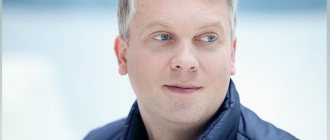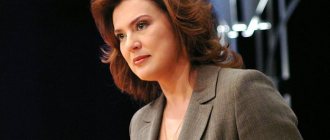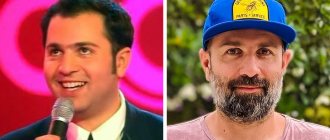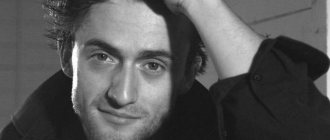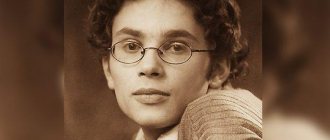Sergey Brin is an American businessman of Russian origin, a scientist in the field of IT technologies, co-founder of Google.
Until 2020, Brin served as director of special projects at Google, and is currently president of parent company Alphabet Inc., which brings together a number of brands, including Google.
Mr. Brin is rightfully considered the richest immigrant in the United States - his fortune is estimated by Forbes at $49.6 billion. He ranks 13th in the Billionaires 2018 list and 35th in the ranking of the most influential people on the planet.
All over the world, the IT specialist is better known under the name “Sergey Brin”. Biography of Sergei Brin, an emigrant from the Soviet Union, an example of the embodiment of the “American Dream”. A talented Jewish boy realized himself in the USA and achieved success on his own. Is the entrepreneur “originally from the USSR” grateful to the country that sheltered him? The success story of Sergey Brin will tell you about this.
Childhood and family
Born in USSR
On August 21, 1973, Sergei Mikhailovich Brin was born into an intelligent Moscow Jewish family. The boy's closest relatives were scientists.
Sergei’s father, Mikhail Izrailevich Brin (born 1948), graduated from the Faculty of Mechanics and Mathematics of Moscow State University. I wanted to be an astrophysicist, but I didn’t get into the physics department: Jewish citizens were not allowed to study physics, which was considered a military science, because of “unreliability.”
Brin's father Mikhail dreamed of becoming an astrophysicist, but became a mathematician because of anti-Semitism
He also did not go to graduate school because of his nationality, but defended his dissertation as a “applicant for an academic degree” and became a candidate of physical and mathematical sciences.
Sergei’s mother, Evgenia Valentinovna (nee Krasnokutskaya, born in 1949), also graduated from Moscow State University. The future billionaire's paternal grandmother Maya Brin taught English.
Brin's parents worked as research assistants: his mother at the Oil and Gas Institute, his father at the Economic Research Institute under the USSR State Planning Committee.
The 1977 mathematical conference, held in Warsaw, showed the head of the family the prospects for the development of the industry. In the USSR, scientists experienced oppression on ethnic grounds and did not see a future, so Mikhail is thinking about leaving the country. In 1978, after submitting documents for a visa, Brin Sr. and his wife were fired from their jobs.
In 1979, Mikhail Brin transports his mother Maya, his wife and 6-year-old son to the land of opportunity - America. The Breens managed to “jump into the last carriage” - later visas were not issued until “perestroika”.
Successful immigration
10/25/1979 The Breens come to America to Maryland.
Maya Brin becomes a professor of Russian Philology at the University of Maryland, where she has been teaching for 10 years. Now the university has a lecturer position named in her honor - Maya Brin Distinguished Lecturer in Russian.
After the death of his grandmother in March 2012, Sergey Brin contributed $600 thousand to establish a fund in her name
The Maya Brin residency program welcomes scientists and cultural figures from the Russian Federation to the United States.
Mikhail Brin gets a job at the University of Maryland as a professor of mathematics, his wife becomes an employee of the climatology department at NASA. Later, Evgenia will head the Society for Aid to Jewish Immigrants, an organization that helped them move. In 2009, Sergey Brin will donate $1 million to this charity.
At the University of Maryland, the Breens have their own circle of friends; the professors become family friends. At first, the Breens did not live richly, but often went to Sutton, Quebec, to go skiing.
In the USA, the Breens have a second son, Sam. He is the CEO and co-founder of Butter Systems, where diners browse menus and order via tablets.
Sergey Brin with his younger brother Sam and his parents
The billionaire's parents are already retired and live in California near their children and grandchildren.
Sergey Brin with his brother Sam and parents
Born in the USSR, emigrated to the USA as a child
Sergey Brin was born as Sergey Mikhailovich Brin.
He was born on August 21, 1973 in Moscow into a family of Russian Jews, Mikhail and Evgenia Brin. At the age of 6, he emigrated to the United States with his family. Parents believed that they had no chance of development in the Soviet Union, and the reason was, in particular, the anti-Semitic policy pursued at that time by Moscow University.
Photo source: TED Conference / CC BY-NC
School years
Primary School
In America, Seryozha enters Paint Branch Montessori, an elementary school where teaching was carried out using the Montessori method. This pedagogical system consists of free education of children with an emphasis on sensory perception. Students are supported in their natural development and taught the skills they will need to become effective members of society.
Montessori pedagogy, according to which Sergey Brin studied, assumes the presence of a specially equipped space
The Breens tried to give the child the best and understood the importance of a good education. To take her grandson to school, Grandma Maya takes her license. A first-grader does not immediately get rid of his accent, but gets used to it well among his peers.
8-year-old immigrant Sergei Brin with his pet named Boss
At the age of 9, Brin Sr. bought his son a Commodore 64 personal computer. In 1982, owning a PC was very cool.
After Montessori school, Seryozha is sent to an elementary school at the synagogue. The boy was not interested in the history of the Jews, and he tortured his parents with requests to transfer him to another institution. When Sergei turned 11, the Brins went to Israel. A visit to the Promised Land had a beneficial effect on Seryozha’s national self-identification. He clearly understood that no matter where he was, he would always be different from everyone else: sometimes he was a newcomer among the locals, sometimes he was the smartest in the class, sometimes he simply had a different nationality.
Sergey Brin: a simple Jewish genius
One of the richest people on the planet, who gave the world Google, celebrates his 42nd birthday today. Who and how cultivated a tendency to rebel in a Jew born in the USSR, what makes him jump over the fence with 30 billion dollars in his pocket, and why it is easier for him to communicate with Israeli schoolchildren than with politicians. In May 2000, at the Webby Award ceremony, an analogue of the Oscars on the Internet, Sergei Brin uttered simple words that, perhaps, in terms of the scale of subsequent events, can be compared with Yuri Gagarin’s phrase “Let's go!” Holding the People's Choice award in the category of technical achievements, he will only say: “We love you, Google users!” – and within a month Google will officially become the largest search engine in the world, having indexed a billion pages. And when Google shares appear on the stock exchange in 2004, Sergey Brin's personal fortune will surpass Microsoft founders Bill Gates and Paul Allen in terms of income growth. Today the birthday boy is in the top twenty richest people in the world. Two weeks ago, he became president of the new Alphabet holding, in which the already world-famous Google, founded by him, is only one of many subsidiaries. He himself is confident: to achieve all this by the age of 42, he was helped by the principles laid down from childhood - to constantly move forward, not to stop there, to only become better.
Seven years ago, Sergey Brin was in Israel on a long visit in honor of the 60th anniversary of the creation of the Jewish state. He was taciturn and serious in his expensive suits at official meetings with Israeli politicians, and relaxed only when, dressed in jeans and sneakers, he arrived at one of the Israeli schools. “My parents are ordinary Russian Jews,” Brin began his speech. – My father is a mathematics teacher, and he has a certain approach to teaching. It's simple. I was told that your school recently received seven out of ten awards in a mathematics competition for Israeli schools. So, in such cases, my father says: what about the other three? "What about the other three?" - This is precisely the question that Brin apparently constantly asks himself, and can be considered one of the explanations for his amazing success.
Both of Sergei Brin’s parents are graduates of the Faculty of Mechanics and Mathematics of Moscow State University. Mikhail Izrailevich Brin is a former researcher at the Economic Research Institute under the USSR State Planning Committee, a candidate of physical and mathematical sciences, who became an honorary professor at the University of Maryland in America. Mom, Evgenia, is a former researcher at the Institute of Oil and Gas, then a NASA climatologist, author of many works on meteorology, and director of the HIAS charity organization. Sergei's grandparents are also associated with science and are widely known. Some researchers of his biography even reach his great-grandmother, Rachel Izrailevna Katsina, who was born in 1886. She lived in Germany until 1914, then was interned in the USA, where she joined the US Communist Party. At the University of Chicago she studied to become a microbiologist, and in 1921 she went to Russia, wanting to build a new, bright socialist future. In 1938, she was appointed director of the Moscow Bacteriological Institute, but was soon arrested and sentenced to eight years in prison for activities “undermining the foundations of communist society.” After her early release in 1941, she worked throughout the war in a field hospital, and then, until the end of her life, in a simple clinic.
Her stories about America at the beginning of the 20th century will inspire in her grandchildren the idea that they can also try. And so, at the end of the 70s, from a small apartment in an ordinary five-story building in the center of Moscow, Mikhail and Evgenia Brina, together with six-year-old Sergei, moved to a small house in Maryland. The Jewish commune helped them purchase a used Ford and enrolled Sergei in an elementary school at the local synagogue. Later, Sergei admits that the bias in the history of the Jewish people was completely uninteresting to him at that time. He will change his mind quite soon: at the age of 11, his parents take him to Israel, and he will begin to prepare for the bar mitzvah ritual. True, at the last moment he will still refuse Jewish initiation, but he will retain thoughts about national self-awareness. “I always felt like some kind of minority,” Sergei once admitted. “I think this is partly a consequence of the fact that I am Jewish.” However, it was precisely this feeling that gave me the realization that you don’t need to be part of the crowd, you need to constantly maintain your independence, strive for rebellion.”
His parents were told about his rebellion at school, which Sergei graduated brilliantly, at the University of Maryland, where he received a bachelor’s degree in Mathematics and Computer Systems ahead of schedule in three years, and even at Stanford University, where Brin became famous for his habit of breaking in for interesting things. conversations in professors' offices. “A cocky young man. But he’s so smart that he gets away with anything,” one of the professors constantly said.
It was at Stanford University that Brin met his future partner Larry Page. “Larry is involved in almost every aspect of my life,” Brin once said. “But above all, he is my best and first friend.” However, as usually happens, at first the future friends did not like each other: they constantly argued and fought. But when they came up with the idea of creating a search engine for the university, they became close, tried it in 1996 on the website google.stanford.edu and were amazed at the results. Requests grew without any advertising, simply thanks to word of mouth: satisfied users of their service told acquaintances, friends and friends of friends about the site. Already in September 1997, the google.com domain was registered, and exactly a year later the company itself was registered. Having already processed tens of thousands of requests by that time, Google moved from the university auditorium to a room on the campus, and later rented a garage in the house of the sister of Sergei’s future wife. Later, this house in Menlo Park, where Google was located in a garage rented along with a room, would become a landmark, and the company would acquire ownership of it.
By the way, Brin proved the “theory” existing in America that the garage is an integral sign of the further success of start-up high-tech companies, because before Brin, the foundations of their company in a rented garage were also laid by Bill Hewlett and Dave Packard, and Steve Jobs’s first Apple was also assembled in the garage. So, having started the “garage production” of the little-known Google in 1997, university friends built one of the most advanced technological and “Don’t be evil” - these are Brin’s two main mottos, which help him make important decisions every day, develop the company, work in which millions dream, while remaining an ordinary guy living in a three-room apartment in America and absolutely calm about money.
“I took a course in circus acrobatics, and on one of the first days of training I got into a fierce argument with some young boy,” says one ordinary American. – We were arguing about the merits of Android versus iPhone. Only later, much later, I was surprised to learn that it was Sergey Brin. But he and I, having become friends during the argument, after class we jumped over fences and crawled under trains on the railway tracks, because it was shorter. I would never have thought that one of the richest men in America could behave this way.”
Another American entrepreneur said that he once found himself in San Francisco for the first time, where at some point he urgently needed to organize a business meeting. There were no smartphones then, so he had no idea how and where to do this in an unfamiliar city. His entire business was on the line when a message from Google came to the rescue, suggesting a great restaurant nearby. Approaching the restaurant, which was around the corner, he came face to face with Brin and poured out such a profuse flow of gratitude to him - for saving the business meeting and for the excellent SMS service - that it took him a good ten minutes. Sergey Brin listened politely all this time, smiled, and only at the end said: “I’m very glad that you like it.” As it turned out later, the Google presentation was delayed exactly ten minutes and exactly in this restaurant, at which the high-ranking guests present patiently waited for Brin, who devoted these ten minutes to a simple stranger.
There is even gratitude to Brin for the gift of family happiness. A man who was about to propose to his girlfriend, moments before the exciting question “will you marry me?” I accidentally met Brin walking down the street. Sergei responded with a mutual greeting and a handshake, moving on. When the bride asked who it was, the groom replied: “This is Sergey Brin, the Dalai Lama for me!” The bride was a devotee of Buddhism, did not appreciate the joke, the evening was ruined, and the marriage proposal failed. "And good! – the excited American writes to Brin. “Now I’m happily married to a completely different chosen one!”
And this is not a complete list of stories about chance meetings with Brin that people share on the Internet, admiring him. Of course, these stories will never affect his company's stock or his place on the Forbes list. But it's more than that. This is a message from a billion users in response to his five-word speech in 2000: “And we love you, Google!” This is him, today’s birthday boy, who has billions of dollars in income, but does not boast of them or his innovative achievements. Believing that his main goal and discoveries in life are still ahead, and unrestrainedly striving for them. In a word - a simple Jewish genius.
Studying at universities
University of Maryland
In 1990, Sergei entered the University of Maryland, College Park, majoring in Mathematics and Computer Science. As a student, by his own admission, he “loafed,” but at the same time he completed the education program ahead of schedule, not in 4, but in 3 years. In 1993, Brin received a bachelor's degree with honors - Bachelor of Arts/Science.
Stanford University
In 1993, Brin received a grant from the National Science Foundation Graduate Fellowship, which opened the doors of any US university to him. The graduate chooses Stanford, majoring in Computer Science. Stanford University, located in Silicon Valley, could not help but attract Brin, who dreams of achieving success in the IT field. Stanford University is one of the best universities in the country; in 2020, for the 4th time, according to Reuters, it was named the most innovative university on the planet.
After graduating from Stanford and receiving a Master of Science, Brin begins work on his dissertation. His scientific supervisor, Rajeev Motwani, who later became an investor and consultant at Google, characterizes Sergei as a “talented, impudent young man.” During his studies, Sergei was actively involved in sports: roller skating, skiing, gymnastics - this is an incomplete list of his sports activities.
KV.by
Sergey Brin, co-founder of Google, has now become one of the richest people in America, a legend in the computer business. Many people know that Sergei was born in Moscow, but not everyone is familiar with his biography in more detail. The Jewish Diaspora magazine Moment published an excellent article (momentmag.com/Exclusive/2007/2007-02/200702-BrinFeature.html) detailing the history of the Brin family. The fate of the Soviet intellectuals who emigrated to America is very typical for that time, especially since 1979 marked the peak of Jewish emigration.
Sergei's parents live in their own house in the suburbs of Washington. The furnishings in the house of Mikhail and Evgenia Brinov are quite modest, without any signs of luxury, except that a large TV and a Lexus in the yard reveal the billionaire’s parents. They look modern, young and cheerful, and laugh often and pleasantly. Mikhail and Evgenia talked with the journalist for several hours, interrupting only for short cigarette breaks from Mikhail - for this, the head of the family went outside with the dog.
Smoking is a habit that Mikhail Brin brought with him from the Soviet Union in 1979, from where he emigrated to the United States with his mother Maya, his wife and six-year-old Sergei (his second son Sam was born in 1987). Sergei’s grandfather, also a professor of mathematics, wanted to stay in Moscow and did not go with his family.
My father's name is Mikhail, 59 years old, he is a professor of mathematics at the University of Maryland. He has been teaching dynamical systems and statistics there for 25 years. Actually, Mikhail wanted to become an astronomer since childhood, but hidden anti-Semitism in Russia did not allow him to do this. This shameful phenomenon really existed, for example, it was almost impossible for Jews at that time to enroll in the physics department of Moscow State University, because the Communist Party did not want to trust them with its nuclear program. Astronomy, to Mikhail’s disappointment, fell under the same “article”. I had to enroll in Mechanics and Mathematics, which Mikhail graduated in 1970 with honors (only three B's) and was assigned to work at the State Planning Committee, but continued to study mathematics on his own, wrote scientific papers and attended the university. He defended his candidate's thesis at Kharkov University, although for the defense he had to find a Russian scientific advisor, purely nominal (Jews could not be scientific advisors when defending the candidate's works of other Jews).
Evgenia Brin (one year younger than her husband) works as a researcher at NASA Goddard Space Flight Center. In Moscow, she also graduated from the Faculty of Mechanics and Mathematics and worked at the Institute of Oil and Gas. She and her husband and his mother lived in a three-room apartment in the center of Moscow. Sergey was born on August 21, 1973.
Mom Zhenya (as she is called in the family) speaks slowly, with a Russian accent, and a sweet voice. According to her, Sergei was a very capable boy from childhood, he loved mathematics and computers.
Mikhail’s accent is somewhat softer, not the same as his wife’s. He is a big Google fan, at least even at home he wears clothes with the company logo.
Father told many stories. For example, in the summer of 1990, 17-year-old Sergei Brin, together with a group of gifted young mathematicians, went to the USSR under a student exchange program. The young man was shocked by the reality he saw. Upon his return two weeks later, he approached his father, looked him in the eyes and said: “Thank you for taking us all away from Russia.”
When the boy was little, he did not understand why his parents were leaving. He was only four years old when dad announced this decision. The decision came to my father after attending a scientific conference in Warsaw in 1977, where he met with colleagues from the USA, France, Great Britain and Germany and became convinced that they were “not monsters at all.” Zhenya and mom didn’t want to go at first, but over time he persuaded them. They applied for a visa in September 1978, after which Mikhail was immediately fired from his job. He started learning programming and translated technical books into English for money.
In May 1979, their application to leave was approved. Then Vienna, a meeting with a Jewish organization of emigrants and a temporary refuge in the suburbs of Paris, where their longtime comrade Anatoly Katok (he was Mikhail’s real scientific supervisor) found a suitable vacancy at a local institute. The family arrived in America only on October 25, 1979.
The Breen family rented a house in Maryland. Borrowing $2,000 from members of the diaspora, they bought a 1973 Ford Maverick. And, on Katka’s advice, little Sergei was sent to the prestigious Paint Branch Montessori School in Adelphi, Maryland. This is an unusual school that uses a “free” teaching method and special techniques to develop intelligence and creativity.
The first year of study was very difficult, because the boy did not know English, but later Sergei showed his best side: he was a very talented child. He subsequently attended Eleanor Roosevelt High School in Greenbelt, where he was already ahead of his normal academic schedule. In three years, he mastered the college program and entered the University of Maryland, where he was one of the best in the group. Then Sergei won a prestigious scholarship from the National Science Foundation and tried to enter MIT, but he was not accepted there, and Sergei entered Stanford.
In the spring of 1995, Sergei met computer student Larry Page (the son of a computer professor, one of the first professors in this field in the United States, and a programmer). He soon decided to drop out of Stanford and start his own company with Larry, which greatly upset his parents. The businessmen received their first $100,000 in venture capital investment from Andy Bechtolsheim, co-founder of Sun Microsystems, even before it was legally registered. The subsequent story has already become a legend.
Sergei became a billionaire, but still buys groceries at Costco and looks at the price tags. He loves to cook, especially Chernobyl chili sauce (45 minutes in the microwave).
According to the Diaspora Jewish Journal, famous is an interpretation of the Kabbalistic concept of “rectifying the world” (tikkun olam).
Anatoly ALIZAR
How Google started
Co-founders of Google: enhanced 2-in-1 effect
Sergey Brin and Larry Page saw each other as a worthy “opponent”. A debate ensues between two capable young people: finally, the smart guys could debate on equal terms. Numerous disputes develop into friendship and cooperation. Sergey is an extrovert, Larry is more reserved. The difference in character made it possible to effectively organize successful activities.
The example of the Google co-founders is not the first and not the last case of a successful partnership; remember the tandems of Hewlett and Packard, Bill Gates and Paul Allen, Steve Jobs and Steve Wozniak. According to a survey by Octopus Group, 76% of solo founders of firms believe that a second founder would make the business more profitable.
Page & Brin - an example of a successful business partnership
Evolution of Startups: BackRub - PageRank - Google
From 1995 to 1998, Brin and Page came up with ideas to make Internet searches easier. They jointly write the scientific work “Anatomy of a large-scale hypertext Internet search system,” which later became the 10th most popular.
Larry dives into the BackRub , which explores back links; Soon Sergei gets involved in the work. Having improved the search algorithm, they call it PageRank (page is both “page” in English and Page’s last name). The updated program evaluates and ranks web pages by importance.
In 1996, Brin and Page created the project's first server, consisting of four 10 GB hard drives. Their “life hack” is its case, assembled from Lego.
Sergey and Larry made the first server case according to the “cheap and cheerful” principle - from designer figures
The co-founders of Google at first could not purchase a large server and assembled several PCs for the network
Where haven't guys found a PC for their startup? They begged friends, looked in warehouses, in case someone ordered it and didn’t buy it. They connected several computers into a network. Poverty became a competitive advantage: the failure of one computer did not affect the operation of the entire server, and repairing such a multi-element server turned out to be easier and cheaper.
In 1997 they call the project "Google". The invented name plays on the consonance with “googol” (from the English googol) - a mathematical term denoting one followed by one hundred zeros. The name of the search engine realized the desire of the startup’s creators to structure the vast amounts of information on the network.
In 2002, the American Dialectological Society, which registers new words, named the word “google” as its “word of the year.”
Search is based on the principle that a person can change the search algorithm, but is not able to influence the specific search result. The rule allows you to produce objective search results.
The test version of the search engine was based on the Stanford web server at www.google.stanford.edu. Having existed there for just over a year, the search engine exceeds the capacity of the university’s Internet channel.
Attempts to sell Google: there would be no happiness, but misfortune helped
The graduate students did not develop Internet search, but they successfully improved its algorithm, which did not limit the speed of the search system. Having valued their “brainchild” at $1 million, Page and Brin decided to sell the innovative technology in 1998. But neither the venture capital fund Kleiner Perkins Caufield & Byers, nor the companies AltaVista, Excite and Infoseek are showing interest in Google. Co-founder of Yahoo! David Philo advised IT smart people to build their own business on the developed technology.
The Google project, which no one bought in 1998, made its creators billionaires in 2004
In August 1998, the Google guys meet with Andy Bechtolsheim, founder of Sun Microsystems. The investor, seeing the commercial potential of the project, writes a check for $100 thousand in the name of Google Inc. - a corporation that was not yet in existence. To cash the check, Brin and Page register a company on September 4, 1998. That same month, the aspiring businessmen moved to 232 Santa Margarita Avenue in Menlo Park, where they rented a bedroom and garage from Susan Wojcicki (sister of Brin's future wife). Susan joined Google in 1999 and has served as CEO of Youtube since 2014.
In 1999, the company moved to larger premises in Palo Alto, six months later acquired its own office in Mountain View, where it still lives, and received a loan of $25 million. It became no longer possible to combine business and doctoral studies, and in 1999 Larry and Sergei left the university. Brin's parents were upset that their son did not receive a doctorate.
Already in 2000, Google became the world's largest search engine.
Biography of Sergei Brin
- On August 21, 1973
he was born in Moscow. - 1979
— emigrated with his parents to America. - In 1993,
he received an early bachelor's degree from the University of Maryland and a National Foundation Fellowship. The same year he entered Stanford University. - 1995
- received a master's degree, began working on a scientific dissertation, met Larry Page. - 1996
year - wrote a scientific paper about a search engine together with Page, launched the first page of the program - On September 14, 1997,
the domain google.com was officially registered. - 1998
- search for investors, after which Google was registered on September 7. He left his studies at Stanford and started developing a search engine. - In 2001,
Google already employed more than 200 people. - 2004
– included in the Forbes list of the world's richest people with $4 billion. - In 2005,
his fortune increased to $11 billion. - 2006
– purchase of You Tube for $1.65 billion, which became part of the Google Video system. - 2007
- got married. - In 2008 and 2011
he became a father and is raising a boy and a girl. - 2015
created the Alphabet corporation, which owns all the companies that belonged to Google. - In 2018
, the corporation entered the TOP 500 best employers in the world.
Brin in the USSR
Sergei Mikhailovich Brin was born into a family of mathematicians in 1973 in Moscow. His parents, Jews by origin, were native Muscovites. My mother worked as an engineer, my father was a famous mathematician. There were times in the Soviet Union when science was not given enough attention.
Sergei's father was denied admission to graduate school and was allowed to attend scientific conferences abroad. Mikhail Brin wrote his dissertation on his own, without even hoping to defend it. In 1979, under the program of emigration between countries, which began to be carried out in the USSR, the father of the future genius was issued a visa to travel to the United States by private invitation.
Mikhail and his family - his wife, son and parents - left the Soviet Union. There were many mathematicians he knew in the USA with whom he communicated and conducted research.
At the age of 6, the Russian boy Sergei Brin turned into an American.
Brin in the USA
The family moved to College Park
is a small town where the University of Maryland is located, where Sergei’s father got a job. Mom became a NASA specialist.
While still a student, the child surprised teachers with his homework, which he printed out on a printer. In the 70s, no one could even think about home computers and personal printers, because they were considered a luxury item.
Sergei’s father gave him a computer and a printer, thereby determining the boy’s future fate. From that moment on, all he had in his head was computers.
Where did Sergey Brin study?
After graduating from high school, he entered the University of Maryland
, where my father and grandmother taught. He received his bachelor's degree with honors ahead of schedule and was awarded a scholarship for the development of science. Sergey went to Silicon Valley, the center of all the technical and innovative companies in the country, in order to develop his technical skills and make a choice in the field of high technology.
Having studied all the possibilities and offers, Sergey Brin chose the most prestigious computer university, Stanford University
.
Outsiders, when viewed from the outside, considered Brin to be a nerd, but he, like most of his peers, preferred parties and having fun over boring studies.
Of all the activities, he spent a lot of time only on gymnastics, dancing and swimming. Even then, an idea appeared in his brain, which in the future was implemented in the form of the Google search engine.
The history of the system’s appearance is quite comical: a young man loved to view images of girls on the Playboy website, but he was too lazy to waste time looking for new photos, so he created a program that did the search itself and downloaded the pictures to his personal computer.
Sergey Brin and Larry Page - the story of acquaintance and partnership
While studying at Stanford, Brin met Larry Page. Together they created the world famous search engine. The first meeting of the two geniuses was not positive, since each of them was proud, ambitious, unyielding, but during their constant arguments, shouting and debates, the phrase “ search engine”
", on which their relationship began to be built.
It is still unknown whether this meeting was fateful. Most critics are inclined to believe that if Sergei had not met Larry, Google might not have appeared. Unfortunately, it is not known why only Sergey Brin is often used as the founder, although this is incorrect. Google is a brilliant project of two programmers - Sergei and Larry.
After the idea appeared, the young people forgot about having fun and spent days creating their brainchild.
In 1996, the first Google page appeared on a computer at Stanford University. The first title was BackRub, which translated as “you give me I give you” and was the scientific work of two graduate students.
The server with the hard drive was located in Brin's dorm room, and the disk capacity was one terabyte. The principle of the system’s operation was not to easily find a page by request, but to sort them by the number of links, by their popularity. Google itself groups search results by the frequency of views by other users. It is this principle of searching and providing information that has been developed.
After defending their dissertation, Sergei and Larry began to improve the system, which was gaining popularity. By 1998, their imperfect graduation work was used by about 10,000 people.
The Russian proverb that initiative should be punished has found application to young people. The university’s service began to consume a lot of traffic, the main consumer of which was the new search engine, and the system also made it possible to view internal documents of the institution, access to which should have been limited. At this point, they wanted to expel Sergei and Larry and accused them of hooliganism. However, everything ended well and, leaving their studies on their own, they continued to improve the program.
The new name
Googol
meant “one followed by one hundred zeros.”
The meaning of the name was that the database allows you to find information in a huge amount of data with a large number of users. The university equipment could not technically support such a volume of requests, so it was necessary to find an investor. The only one who responded to their proposal was the founder of Sun Microsystems Andy Bechtolsheim
.
He did not listen to their presentation and immediately believed in success. The check was written 2 minutes after I found out the name of the new program. However, due to his carelessness, the investor indicated in it the name not Googol, but Google
, and in order to receive money from the check, I had to register a company with that name.
The young people took academic leave. Over the course of a week, we called all our friends and relatives and collected money to register the company.
September 7, 1998 is officially considered the date of birth of Google.
The first staff of the company was 4 people - Sergey Brin, Larry Page and 2 of their assistants. The bulk of the money was spent on developing the program and there was no money left for advertising. The efforts paid off. When in 1999 all major media outlets were already talking about a new and good Internet search engine. The number of users increased many times over; Brin and Larry noted that the system could not be limited to a few servers and was supported by several thousand personal computers.
Sergey Brin and Google: waking up as a billionaire
Page becomes the company's president of products, and Brin becomes president of technology. Since 2011, Sergey Brin has been leading special projects, and since 2020 he has been the president of the Alphabet conglomerate.
On August 13, 2004, the company completed its initial public offering. Google announced an IPO for a total amount of $2,718,281,828 - this is the value of the fundamental mathematical constant “e” (e ≈ 2.71828..).
Having estimated the share at $108–135, the company's co-founders reduced the price to $85. As of January 2020, Google is offering just over $1,070 for one security (NASDAQ: GOOGL Alphabet Inc.).
Brin, 30, owned 38.5 million shares and the IPO made him a billionaire. A great gift on the eve of a birthday!
In 2020, Google was reorganized into the international conglomerate Alphabet Inc. The new company replaced Google Inc. as a public company. Larry Page became its CEO, Sergey Brin became its president.
Creation of Alphabet Inc. aimed at improving the management of unrelated projects. In addition to companies with technological specialization, areas in the field of healthcare Life Sciences, Calico, investments, etc. are highlighted.
Celebrated its 20th anniversary in 2020. Its market capitalization was $367.6 billion and sales were $66 billion (Forbes 2018). The Google trademark took 2nd place among the most valuable brands and is valued at more than $132 billion.
Google is not only the best search engine, but also convenient services and tools: Google Translate translator, Google Chrome browser, Android OS, Google Earth, Google Maps, Gmail email, YouTube video hosting resource (purchased in 2006), tools for contextual advertising Google AdWords, etc.
Sergey Brin now
Sergey Brin is one of the twenty richest people on the planet.
In 2017, he ranked 13th with a net worth of $39.8 billion (Larry Page was 12th with $40.7 billion). Brin is co-president of Alphabet (Google's parent company). Choosing between the two founders of Google, we chose the most significant and more relatable. Well, why do we need Larry Page if there is a former guy of ours named Seryozha, with a typically Slavic surname Brin. In any case, his face is nicer than his colleague’s.
In addition, we are not left with the hope that, delving into his brainchild, looking for an article about his beloved, he will stumble upon our modest work from a heap of mediocre biographies. And at this very moment a person from the Forbes twenty will think and say: “Good, devils. I will spend the money not on charity, but on them,” and we will begin to write even better with delight. Of course, the idea is utopian, but what the hell is it? He managed to turn a simple and incredibly modest native of Russia into a multi-genius who is admired and envied. A simple “poz” from a decent Jewish family, where his father was a mathematician and his mother was an engineer. Seryozha and his parents left his uncle Lenya Brezhnev and the entire USSR in 1979, when he was only 6 years old. However, this does not prevent him from claiming that in the USSR he was constantly faced with the machinations of anti-Semitism. Apparently, the harsh socialist childhood was so harsh that there were no other memories left. He hasn't collected scrap metal yet.
Sergey Brin: “I’m not like everyone else, and my company is also not like others”
How the staff expanded: “Hire me if you can”
Google's first employee is a classmate of the co-founders, Stanford doctoral student Craig Silverstein. When the team grew to 40 people, in 1999 another specialist joined the staff - Charlie Ayers. He was neither a technical genius nor a sales specialist. Mr. Ayers is a top notch chef! After all, Google is people first and foremost!
The first employees of Google. Now the staff of the international company consists of 53,600 people
Since its founding, the company has received more than 5 million applications from applicants. Google management is innovative when it comes to selecting the right candidates. Once there was a math quest that started with a hint on a roadside billboard, and only after solving all the problems did applicants get a chance to get an interview at Google. The founders of the company do not look at diplomas; talented, self-taught specialists who did not graduate from college also work here.
In 2020, Google took pride of place in Forbes list No. 6 as the best employer for graduates (Best Employers for New Grads) and
and #17 among employers for women (Best Employers for Women).
Profitable charity
The company specifically sponsors improvements in the quality of education, essentially “cultivating” future talented employees nearby:
- summer program “The Summer of Code” to introduce students to opensource development technologies (costs $2 million)
- The Anita Borg Scholarship is for gifted graduate and undergraduate students studying computer science (named after Ms. Borg, one of the first female PhDs in computer science).
Corporate culture: “so that the cow gives more milk”
Google employees have access to cafes and micro-kitchens with free lunches.
Self catering kitchenette
Believing that well-fed workers are more productive, Google invests $72 million annually. for their food. Compared to Brin and Page, Jeff Bezos is just a Scrooge McDuck, who doesn’t even provide free parking to Amazon.com employees.
The headquarters is located in the Googleplex building, whose name refers to the number "googolplex", a one followed by one hundred zeros.
Google headquarters "Googleplex" in Mountain View, California
There is a vegetable garden at the company headquarters
In addition to “daily food”, the workers have access to tennis, billiards, fitness centers, massage rooms, beauty salons and meditation rooms. Googleplex is not like the conservative offices of established companies.
Sports facilities are one of the free services for Google employees
The company also demonstrates its originality in the design of 70 work spaces in more than 40 countries. The interiors of the representative offices are designed taking into account the local flavor.
Meeting room “38 parrots” in the Moscow office of the company
The relaxation capsule of the Moscow office of the Google representative office offers a wonderful view of the capital
A fifth of the working time is allowed to be allocated to projects that are not included in the scope of duties, but lie in the professional sphere. The Gmail mailer was born thanks to the time allocated for “thinking”.
Google is a good example of good corporate communication. On Thursdays, Larry Page and Sergey Brin chat with employees about how Google's mission is being realized in the world.
Mission
Informality in corporate culture does not interfere, but, on the contrary, speeds up the processes of decision-making and bringing new ideas to life. The 9th commandment of Google says that you can be serious without a tie. Well, the 1st commandment.
Why Larry Page and Sergey Brin stepped away from managing their parent company Alphabet
The parent company of Google is changing its management structure: the founders of the IT giant Larry Page and Sergey Brin have retired. They transferred control of the Alphabet holding, which includes Google, to Sundar Pichai, the current CEO of the company. Page and Brin assured that they will continue to participate in the work of the corporation, but as members of the board of directors. And they added: “We have never been the ones who will hold leadership positions.” How will their departure affect Google and Alphabet? Gleb Silko talks about this.
The story of Sergey Brin and Larry Page began in 1995, when they met at Stanford University. In just three years they will create a company that will dictate trends in the world of IT technologies. In their farewell letter to Alphabet employees, they wrote: if the company were a person, it would be 21 years old now and it would be time to leave the nest. And Brin and Page are now ready to become proud parents and give their organization advice and love, but not everyday grumbling. Their duo is considered one of the most successful in the world of big business, says Leta Group President Alexander Chachava: “Of course, this has been a tandem for many years - they have been creating this product together since Stanford. There is no reason to say that this duet is ineffective or has lost its relevance. They always had quite different roles in the company: Sergei was always responsible for the technical side, for technology, and Larry was for business, for managing the company. And this, in fact, is also the key to successful cooperation, when, in fact, there is no conflict of interest, each person is engaged in his own area.”
Forbes called the departure of Brin and Page “the end of an era,” and The New York Times believes that their decision is also a turning point for Google. But it’s unlikely that anything will change seriously, says IT expert Alexander Baulin. History is full of examples of successful companies whose founders faded into the background over time, but the business continued to perform well, he adds: “To say that this will cause the demise of Google is strange, because for all their huge contributions, it not Steve Jobs, and even without Steve Jobs, Apple lived normally for some time.
The influence of the founders on the company should not be exaggerated.
Brin and Page have been consistently handing over some tactical things for a long time, and, apparently, they will now hand over some of the strategic management, because they have succeeded in a lot, they have achieved a lot, they want to switch to some new areas, and this takes time.”
And although Brin and Page themselves cite the desire to simplify the management structure as the reason for their departure, few believe this. American journalists remind: local authorities have many complaints against Google related to the use of personal data. Now Brin and Page may fear the fate of Mark Zuckerberg, the head of Facebook, who is constantly called to report and testify before the US Congress. Perhaps that is why Google executives decided to make a reshuffle. But this is unlikely to relieve the company itself of claims, says Yuri Rogulev, director of the Franklin Roosevelt Foundation for US Studies at Moscow State University: “The United States Congress has really taken care of the problem that is associated with the collection of personal information and, in general, has always been a sensitive topic for America . When commercial companies begin to actively carry out such work, this, of course, causes a corresponding reaction from legislators, and I don’t think they will lag behind this for long.”
One way or another, Google is waiting for some new stage. Even if the company doesn't end up dead-end, it has clearly made a new turn. “Kommersant FM” was able to talk on condition of anonymity with one of the company’s employees. He said that Brin and Page regularly sent letters to Google employees that everyone loved to read. Whether this tradition will remain is unknown. The markets immediately reacted to the decision of Page and Brin: trading closed with Alphabet shares falling by several percent.
Google Glass project: “smile, you’re being filmed by a hidden camera”
Brin oversaw the company's special projects in the Google X division. The first big project of the “secret laboratory” was the Google Glass augmented reality glasses, announced in the summer of 2012. This headset for Android smartphones is equipped with a display and a camera located slightly above the right eye.
In all photographs from 2013, Brin appears wearing a Google Glass headset.
As part of the presentation of interactive glasses Google Glass, Brin jumped with a parachute
Sergei Brin's parachute jump was recorded using Google Glass
The smart glasses project entered the podium in 2013.
During the show of Diane Von Furstenberg's collection, online filming was carried out, available for viewing on the designer's profile on Google+
Mr. Brin said his favorite feature of smart glasses was time-lapse photography. Now, when playing with children, he did not look away to capture them, but simply turned on the time-lapse mode.
But Google Glass never became available to the masses. Already in 2013-2014, there were bans on wearing augmented reality glasses: being near glasses wearers caused discomfort... Not only privacy activists, but also ordinary people did not like being in surveillance mode. Owners of smart glasses have been called “cyborgs,” and signs have appeared in a number of establishments prohibiting their wearing.
Brin's credit is for embracing innovation; new tools come with new responsibilities; not only technical but also ethical issues have to be addressed. “Smart glasses” are now positioned as a working tool for those specialists whose hands are busy during work: medical workers, CNC machine operators, etc.
Brin's new case: ghost cars
After smart glasses, Sergei took up the project of driverless cars. Among the creators of the Googlemobile are the head of the Stanford AI laboratory, Sebastian Thrun, and a number of Google engineers. In December 2016, the project was spun off into a separate company, Waymo, part of the parent company Alphabet.
Beta versions of Google's self-driving car roam the streets of San Francisco
Personal life of Sergei Brin
Married man status
Brin met his future wife, Anne Wojcicki, at Stanford. The girl became a worthy match for an ambitious genius: smart and athletic, she received a biotechnology degree from Yale (1996), played on the college hockey team, skated and was fond of yoga. In addition, the girl was from the “right family,” which pleased Brin’s parents: Ann’s maternal great-grandfather was a rabbi in Russia and moved to the States in the 1920s. In 2006, Ann founded the biotechnology firm 23andMe.
Their wedding took place on a beach washed by the Caribbean Sea.
The wedding ceremony of Sergey Brin and Anne Wojcicki took place in the Bahamas in May 2007
The bride and groom reached the beach where the wedding ceremony took place by swimming. Their outfits were traditional only in color, but not in shape: Ann walked down the aisle in a white swimsuit, Sergei in black swimming trunks.
The couple settled in Los Altos and, with their charitable activities, earned comparisons with another famous couple, Bill and Melinda Gates. Buying up real estate, the Breens rent it out for children's cafes and bookstores at below market prices. Thanks to their efforts, Los Altos now offers a large number of services for children, including a children's science center.
Ann and Sergey Brin
In December 2008, the couple had a son, Benji, and at the end of 2011, a daughter, Chloe.
Sergey Brin with his first child Benji
The couple gave their children the surname "Wojin" - a derivative of the surnames of Bryn and Wojcicki
A person close to them admits that sometimes in his family life Brin “turned on the star”: how is it that he, the head of a large company, comes home and has to change the child’s diapers? However, this was not the reason for their separation. Since 2013, according to Bloomsbury, the couple lived separately, although they did not advertise the breakup. Ann later admitted that she felt awkward when her acquaintances conveyed greetings to Brin through her. The couple filed an official divorce on 05/01/2015 in the court of Santa Clara, California.
The wife and children remained in the Los Altos house for $7 million, and Brin moved to a second house in the same Los Altos to be closer to the children and raise them together with his ex-wife.
Google Glass Project: Looking in Both Eyes
The reason for the Brins' divorce was Sergei's affair with his subordinate Amanda Rosenberg (born approximately 1987), a marketing manager. The couple violated the boundaries of their official relationship while working on the Google Glass augmented reality glasses project.
Sergey Brin with his wife Ann wearing smart glasses that destroyed their marriage
Brin's wife tried to help her husband work on Google Glass. Amanda frequented the Breen home under the pretext of discussing the promotion of smart glasses with Ann. At that time, Amanda was in a relationship with the vice president of Android product management, Hugo Barra, but Brin seemed more promising to her. As colleagues note, Amanda initially sought publicity rather than fulfilling her work duties.
Amanda Rosenberg, an Englishwoman with Jewish and Chinese roots, who destroyed the marriage of Sergei Brin
The story of this office romance is by no means new; the world of technology is a world of men, and hunters of respectable suitors are not stopped by the fact that some of them are married. “You can get a Stanford diploma, which means you can get a job at Google, which means you can find yourself a husband,” is the philosophy of young “hunters” for grooms.
Sergey Brin and Amanda Rosenberg, the girl for whom the Google co-founder left his family
Brin and Rosenberg continued to work together at Google X, which displeased their colleagues. As a result, the romance between Rosenberg and Brin ended, but he never returned to the family.
Start with a clean slate
After the divorce, Anne Wojcicki's boyfriend becomes Alex Rodriguez (aka A-Rod), a professional American baseball player who has several love stories with celebrities: Rodriguez dated Madonna (2008), Kate Hudson (2009) and Cameron Diaz (2010-2011). ).
The first joint appearance of the ex-wife of Sergei Brin with her baseball player boyfriend Alex Rodriguez in 2016
Brin is now having an affair with the founder of ClearAccessIP, Nicole Shanahan. Perhaps she will become the second wife of the Google co-founder.
Sergey Brin with his new lover Nicole Shanahan
Sergey Brin and Nicole Shanahan at the Breakthrough Prize ceremony on November 4, 2020 at NASA Ames Research Center, Mountain View, California
Google is born
In the early 90s, he met the young scientist Larry Page. According to one version, Page was instructed to show Sergei the campus and tell him how everything worked there, and during the excursion they found a common language. Another version says that at first Page and Brin, as often happens among people of equal intelligence, disliked each other and competed.
Sergey Brin and Larry Page
One way or another, the acquaintance took place, and then grew into strong friendship and fruitful cooperation. At that time, Brin was passionate about developing a search engine that would greatly simplify the use of the Internet. He was amazed that Larry not only supported his idea, but also made several useful amendments and suggestions.
The friends abandoned other things and directed all their creative energy towards the implementation of their project. Soon a trial search engine, BackRub, appeared, which not only found the necessary pages on the Internet, but also systematized them by the number of requests. All that remained was to find an investor who would believe in their development and invest a tidy sum in it.
Sergey Brin and Larry Page created Google
Stanford refused to pay for the experiments of young programmers: not only did their search engine “eat up” half of the official Internet traffic, but it also gave ordinary users documents intended purely for official use. The friends were faced with a choice: abandon the brainchild and continue working on their doctorate, or look for an investor for their project.
It was businessman and founder of Sun Microsystems Andy Bechtolsheim, who allocated one hundred thousand dollars to young scientists. They collected the rest of the required million from relatives and friends. September 7, 1998 is considered the official birthday of Google, and the first office of the future giant of the IT industry was located in the garage of Brin's friend Susan Wojcecki.
Sergey Brin and Google glasses
There is a popular story that Brin and Page wanted to name (after ten to the hundredth power), but the investor wrote them a check in the name , and the friends decided to leave everything as it is. This is not true, but what an interesting legend!
Sergey and Larry took academic leave from the university and devoted themselves entirely to the project. Just two years later, their website received the prestigious Webby Awards. In the early 2000s, developers created an algorithm that helped advertisers offer users products based on their search queries (we now know this algorithm). In 2004, the names of young scientists appeared on the list of billionaires of the prestigious Forbes publication.
Brin's possible fatal diagnosis: "the patient is most likely alive"
When in 2007 Google invested $3.9 million in the biotechnology company 23andMe, founded by Brin's wife, Sergey had no idea that he was investing in his health.
Genetic testing technologies make it possible to identify susceptibility to certain diseases. A DNA study of Sergei Brin showed his predisposition to Parkinson's disease (gradual death of nerve cells). Unlike Steve Jobs, who strictly guarded news about his health, Brin started a blog and publicly announced test results at the Google Zeitgeist conference in 2008.
Brin calls knowledge of a possible future diagnosis of Parkinson's disease "luck"
The 10,000 patients with Parkinson's disease that 23andMe is researching will help reduce Brin's risk of developing the disease by about 10%.
The ex-wife of Sergei Brin admitted that she misses poverty, which made her more creative
ALL PHOTOS
Anne Wojcicki November 9, 2014 Reuters
Anne Wojcicki and Sergey Brin, November 9, 2014 Reuters
Anne Wojcicki and Sergey Brin (pictured right), July 2008 Reuters
The ex-wife of Google co-founder Sergey Brin, Ann Wojcicki, a year after the divorce, is a very wealthy woman, but, as it turns out, she still remains a lover of freebies. And she even misses the times when she had to save every cent.
In an interview with The Sunday Times, Wojcicki admitted that she once drank so much free carrot juice at work that her skin turned orange. “It was a very expensive juice and I felt like I had to drink as much of it as possible. So I drank one liter every day for a year and became completely orange. You see, as a child, my mother and I could only afford the cheapest things. And when something is offered for free, I feel like, oh God, I have to take as much as I can,” she explained.
When she divorced Bryn, Anne Wojcicki shared her $30 billion fortune with him, but she still never orders drinks in restaurants. Wojcicki also leaves his car in the wrong places, believing that fines for illegal parking are cheaper than honest and timely payments. And in general, living with two children in an extravagant house with a nanny and a cook in Palo Alto, the de facto capital of Silicon Valley, she misses the old days when her budget was limited.
“I think not having money makes you much more creative,” The Daily Mail quotes her as saying.
Wojcicki and Bryn married in 2007 in the Bahamas. They were connected by the desire for science and the poverty experienced in childhood and adolescence. Brin's parents, Jewish emigrants from Moscow, moved to the United States when their son was six years old, with the help of a charitable organization. They were enthusiastically received by the local scientific community, but for a long time the family was forced to save on the essentials. Ann's parents were poor teachers.
By the time of the divorce, the spouses had a number of successful joint business projects under their belt. In particular, Wojcicki, a biologist by training, founded the biotechnology company 23andMe, which deals with DNA research.
Recently, a test from this company went on sale in the UK, allowing one to assess the genetically determined risk of developing about 100 types of diseases, including Alzheimer's, Parkinson's and Huntington's diseases. The test costs £125. As The Daily Mail noted, similar offers from other developers are much more expensive and provide less information. While describing the benefits of this testing, the publication also expressed concerns about the development of the nocebo effect in impressionable patients and the danger of leaking medical data similar to the recent Google breaches.
Let us add that Sergey Brin continues to invest in healthcare projects even after the divorce. So, in the fall, Google acquired a biotechnology company that developed a special spoon for people with diseases such as Parkinson's disease. The technology, similar to stabilization mechanisms in cameras, allows one to cope with hand tremors, the report noted. Sergey Brin has a serious personal interest in the project - his mother suffers from Parkinson's disease, and genetic testing showed a high risk of developing the disease in himself.
Let's add that Sergey Brin and Anne Wojcicki divorced in 2013, after it became known about Brin's affair with one of the Google employees. Wojcicki's sister Susan remained with the company and took over YouTube in early 2014. Let's add that Sergey Brin and his partner, Larry Page, founded the company in a garage that belonged to Susan Wojcicki.
Charity
Brin finances areas close to his heart. Many billionaires do this; the writer JK Rowling, for example, sponsors single mothers and centers for the treatment of multiple sclerosis. Sergey Brin's philanthropic index is 4 out of 5 points. Here is a partial list of Brin's charitable activities:
- sponsors the Breakthrough Prizes. It's a kind of Oscar of science, where tech millionaires present prizes to scientific geniuses. The amount of the award exceeds the value of the Nobel Prize and amounts to more than $1 million.
- Together with his parents, he contributed $1.5 million to the University of Maryland to study Parkinson's disease.
- Donated $7 million to Parkinson's Institute
- $150 million supported the Michael J. Fox Foundation, a charitable organization that raises funds for such research
Brin and Page are investing in energy projects aimed at making clean energy cheaper than non-renewable energy.
In 2004, business partners created the charitable organization Google.org, the fund of which, replenished from personal funds and the resources of private philanthropists, is used for the benefit of civilization.
They also introduced the "law of one percent": every year, 1% of the company's equity and earnings, as well as 1% of employees' time, is dedicated to creating a safer and more resilient world.
Google co-founder Sergey Brin married for the second time
The billionaire's chosen one was 34-year-old economist, lawyer and programmer Nicole Shanahan. According to insiders, the wedding was modest
Nicole Shanahan and Sergey Brin. Photo: AP/TASS
With a net worth of $52.7 billion, Google co-founder Sergey Brin married 34-year-old Nicole Shanahan, a well-educated girl and owner of a private company. According to Page Six, the wedding took place some time ago and was modest. The celebration became known from Nicole herself.
Bryn and Shanahan have been together for three years; last year the couple had a daughter. In addition to her, the American with Russian roots has two more children from his first marriage to biologist Anne Wojcicki. The couple divorced in 2020 due to the multibillionaire's infidelity.
In 1998, the parents of his first wife rented out a garage to Brin for his startup. In 2007, already a billionaire, he married Ann, who became the 16th employee at Google. The wedding took place in the Bahamas. The newly-made spouses entered into a prenuptial agreement, so the divorce was peaceful, and the ex-spouses remained on good terms.
Ann is an avid fan of healthy lifestyles and a biologist. She graduated from Yale University, and 13 years ago created and led the company 23andMe. The company, worth $2.5 billion, is engaged in biotechnology: diagnosing genetic diseases and developing medications. The company has the largest DNA fund in the United States. Wojcicki's net worth is estimated at $690 million. She is on the 33rd place in the Forbes ranking among the richest American women.
Brin divorced his first wife because of an affair with her friend, a Google manager. The billionaire’s second wife, Nicole Shanahan, is a lawyer by training (she studied at Santa Clara University School of Law) and a bachelor’s degree in economics (graduated from the University of Puget Sound). In addition, Shanahan, like Brin, studied at Stanford, at the Center for Legal Information Science. Like the co-founder of the IT giant in her time, Nicole, while still a student, created the company ClearAccessIP, which provides services in the IT field.
Like Brin's first wife, Shanahan is also involved in biotechnology. In particular, it funds research in the field of women's reproductive health. And her Bia-Echo Foundation has given over $7 million to the Buck Institute for aging research.
Sergey Brin also donates enormous sums to specialized organizations to fight aging. His mother was diagnosed with Parkinson's disease. Research has revealed that Brin has a similar genetic predisposition, and he is looking for a solution to the possible problem. Here is one of his quotes: “If it turned out that to defeat Parkinson’s disease you need to write a check for 1 billion dollars, I would do it without hesitation.”
Interest in today's stars of the world of Internet technology and science is sometimes comparable to the excitement around Hollywood icons, says TV presenter, owner of the PR Trend agency Ekaterina Odintsova .
— The founders and creators of companies that change the world - and Google, of course, is one of such companies - now mean even more in the public consciousness than movie and theater stars in the last century. Because then movie and theater stars gave illusion and showed people another life, some other world. Now their place has been taken by those who create life on the Internet. It seems to me that the influence of IT technologies on people’s lives is so great that people who are involved in it certainly become thought leaders and legends during their lifetime.
— Are they qualitatively different somehow? Habits, character traits of the old-style elite?
“I can say that these people, of course, are very different from artists, and in general from all other people, including in that they do not need fame at all, it does not interest them. This is what makes them even more interesting.
Sergey Brin prefers an informal style of clothing. The billionaire tries to save on everything and eat up everything that remains on the plate. He loves sports and does aerial acrobatics, pilots airplanes, and builds an airship. Brin offered Roscosmos $35 million for a flight into space on the Soyuz, but was refused.
Add BFM.ru to your news sources?
Portrait of an entrepreneur
Portrait of an entrepreneur
Billionaire in a T-shirt
A black T-shirt and dark jeans, a quick and humorous conversation - the image of a “simple guy” suits Sergei very well.
Sergey Brin not only runs, but also gives interviews in funny Vibram FiveFingers sneakers
Humorist
Brin has an inherent sense of humor, which he demonstrates to the public: “Sorry, I got a message from a Nigerian prince, he’s asking for 10 million. I don’t ignore such requests, because that’s how we collected money on Google.”
Brin often demonstrates his sense of humor at performances.
Brin takes even April Fool's Day seriously. On April 1st, Google always comes up with something like this:
- announces the creation of a new airline founded jointly with Richard Branson
- announces the closure of Youtube
- introduces technology for transmitting odors through a smartphone
- It was in April 2013 that Brin was spotted driving a “Batmobile”: a pink Tesla Model S with eyelashes above the headlights.
And in the search engine, if you dig around, you can find several jokes: if you enter the word “askew” in the search line, the page will “skew”
When you try to search Google for “askew”, the search results are distorted
But Brin’s humor in life and professional activity is the outer shell behind which hides a purposeful, serious and assertive businessman. At Code 2014, Brin admitted that he's "kind of a weirdo" and shouldn't even be working on the company's social network Google+ because he's not very social.
Looking to the future: what's next?
Technologies pioneered by Sergei Brin have changed the world. Google tools have become a part of modern life.
While The Economist calls Sergey Brin an “enlightener” for his commitment to using science to solve global problems for humanity, the IT beacon himself gives people not at all innovative advice: trust yourself, develop your imagination and follow the idea. At the World economic forum Davos 2020, Brin admitted that he was surprised by the speed of evolution of artificial intelligence (AI). But he was nearby all the time, inside, so to speak, his research: AI is used in the company’s data storage and processing centers, and in Google Translate, and in Waymo’s autonomous cars.
Brin calls our time a “technological renaissance,” “an era of great inspiration and opportunity,” and “an age shaped by the digital revolution.” At the same time, he emphasizes that one should think about what role innovation plays for society in order to use it for good. Brin's credo, which is embodied in the company, is “Don't be evil,” which means doing ethical things.
List of sources
- Janet Lau. Google. Past, present, future"
- profile on Forbes https://www.forbes.com/profile/sergey-brin/#654766e84b43
- Instagram https://www.instagram.com/sergeybrinofficial/
- "Alphabet" on Forbes https://www.forbes.com/companies/alphabet/#3a3ad52d540e
- Google on Forbes https://www.forbes.com/companies/google/#560a7f3a5d28
- website "Alphabet" https://abc.xyz
- about Google on the official website https://www.google.com/about/
- interview in Russian https://www.youtube.com/watch?v=bS-TMucAsYY
- https://www.youtube.com/watch?v=lO43ZvUWJNY
- video walk through Googleplex https://www.youtube.com/watch?v=eFeLKXbnxxg
- https://sllc.umd.edu/russian/mayabrin/about
- Stanford Faculty https://cs.stanford.edu/about/gates-computer-science-building
- divorce https://www.bloomberg.com/news/articles/2013-08-28/google-co-founder-sergey-brin-splits-with-wife-anne-wojcicki
- AI concern https://www.forbes.com/sites/samshead/2018/04/28/google-billionaire-sergey-brin-urges-caution-on-ai-development/#7a5ad0ad26a7
- Google Glass project https://x.company/glass/ and others.
Dessert Video: 12 Cutest Baby Animals
